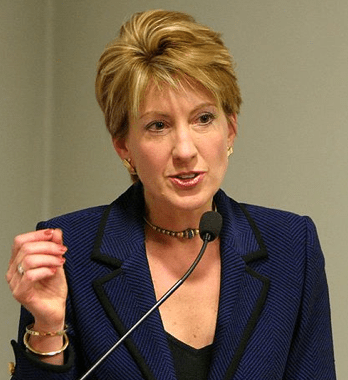Carly Fiorina rose to the heights of corporate American and then was forced aside in a public circus. Her resilience is an inspiration to us all.
Analyzing the first quarter-century of Carly Fiorina’s life would not necessarily lead to the conclusion that she would become (according to Forbes, Fortune, and Time magazines) one of the most powerful women in the country and the world. Her father moved frequently so her education was fragmented. She attended five different high schools, including one in Ghana. When at Stanford, she earned a B.A. in medieval history and philosophy. After getting a good taste of law school, she dropped out, leading her lawyer father to predict that she would not succeed in life.
Then Carly Fiorina earned an MBA and was hired by AT&T. After ten years she became the division’s first female officer and later head of North American sales. When AT&T decided to spin off Western Electric and Bell Labs into a new company named Lucent, Carly Fiorina guided that transition. Lucent’s IPO was the most successful in U.S. history, raising $3 billion. Fortune magazine named her the “most powerful woman in business.”
When Hewlett-Packard was searching for a CEO in 1999, Carly Fiorina was selected over an internal candidate (also a woman). HP revenues improved, patents increased, profitability and cash flow improved. Over objections from some board members and stockholders, she reorganized Hewlett-Packard and merged with Compaq, creating the world’s largest personal computer manufacturer. When Carly Fiorina became CEO of Hewlett-Packard she proclaimed there was no glass ceiling. By the time she was forced out of Hewlett-Packard, she had changed her view.
After Hewlett-Packard, Carly Fiorina founded Carly Fiorina Enterprises to promote entrepreneurship and innovation, build leaders and organizations, engage women and target philanthropy. After serving as fundraising chair for the presidential campaign in 2008, she ran for Senate from California, but lost to incumbent Barbara Boxer. She has served on boards for the Defense Department, the CIA, and the Department of State as well as a number of corporate boards and MIT. Her One Woman Initiative program empowers women in the Muslim world and she chairs Good360, a nonprofit that assists companies who donate excess merchandise to charities.
LEARN MORE:
Read her memoir, Tough Choices, about her career and her views on leadership, women in business, and how technology is reshaping the world.
QUESTION OF THE WEEK:
Have you ever been publicly humiliated and felt that your gender contributed to other’s perceptions of you?

